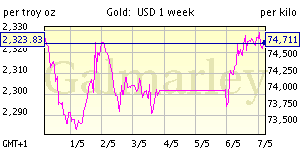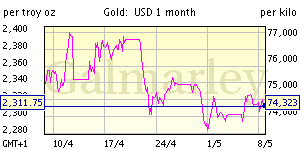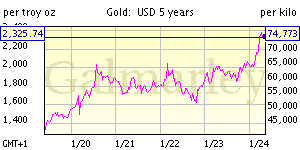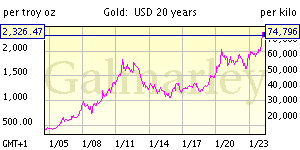The simple answer is supply and demand. When more people want to buy it than sell it, then the price is bid up by the buyers until the sellers are willing to part with their gold. So the bottom line is this: In times of crisis or turmoil, gold is always the money of ultimate safety, and the price is bid up accordingly as the masses get rid of their paper investments, preferring to conserve their wealth in an asset that cannot be maniputlated, defaulted on or counterfeited.
If/when our current monetary system collapses from the weight of its own debts, the rush to the gold lifeboat will be fast and furious. Of course there is not enough for everyone to have some (more buyers than sellers), so the price will be bid up in a frenzied manner. We could see $10,000 an ounce gold within a matter of hours, and I am deliberately being conservative here in my conjecture!
To get an idea of how this situation might look, take a peek at the video clip below from the 1983 classic Trading Places with Eddie Murphy and Dan Ackroyd. They are trading OJ not gold, but the principles are the same.
Enjoy.

Scene Summary
The Duke brothers (Commodities Brokers) tried to steal the Orange Juice Crop Crop Report. But Billy-Ray and Lewis (Eddie Murphy and Dan Ackroyd), after having been poorly treated by the Dukes, get the real report and give the Dukes a fake.
The Dukes send their trader to the commodities floor with instructions to buy like crazy. Their fake report shows a tough winter, and so they're betting the price will go way up after the "official" release of the report. The trader starts buying and others see the Dukes trying to corner the market, so they start buying. This drives the price up.
At just the right time, Billy-Ray and Lewis "sell" futures contracts for orange juice. They sell like crazy. They're selling contracts for orange juice they don't even own and can't deliver. This is called "short-selling.* Their selling drives the price down a bit. It also pads their trading account with a ton of cash.
The secretary of agriculture announces that the winter did not affect the crop, so the pit full of traders freaks out! There's not going to be price pressure, so they're all holding OJ contracts that are seriously overpriced. A mad selling frenzy ensues, driving the price way down.
Again at a point timed for maximum effect, Lewis and Billy-Ray Valentine announce that they'll "buy em" -- they buy back the OJ contracts at a much lower price than they sold them for earlier, netting them a huge profit. They also refuse to sell to the Duke's trader, freezing him out.
The Duke's get a margin call and go bust and our heroes make a lot of scratch. Of course, in real life, trading curbs and circuit breakers would prevent either side of this play, but it is educational and funny to watch.
*Short-selling is a financial transaction in which traders who think the price of a commodity is going to drop, will enter into a contract to sell the commodity at the currently higher prices. To short-sell commodities all you have to do is be able to deliver at the date in the contract. The idea is to buy the contracts back at a later date and a lower price, and then be able to deliver the commodity as promised. It is basic buy low/sell high, with the selling done before the buying.
![[Most Recent Quotes from www.kitco.com]](http://www.kitconet.com/images/quotes_7a.gif)






